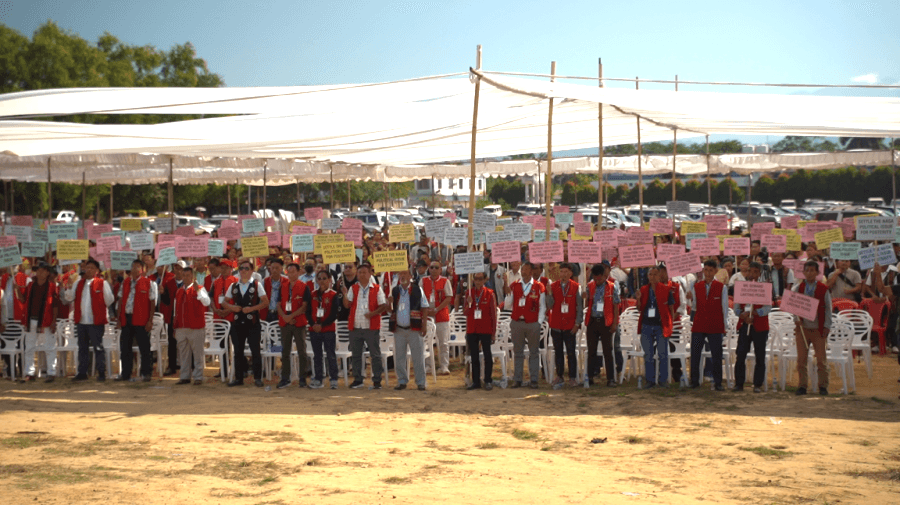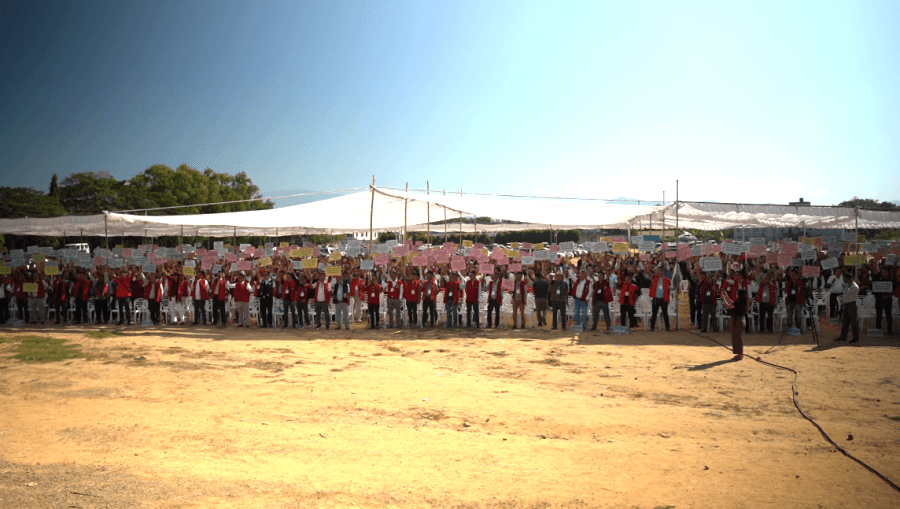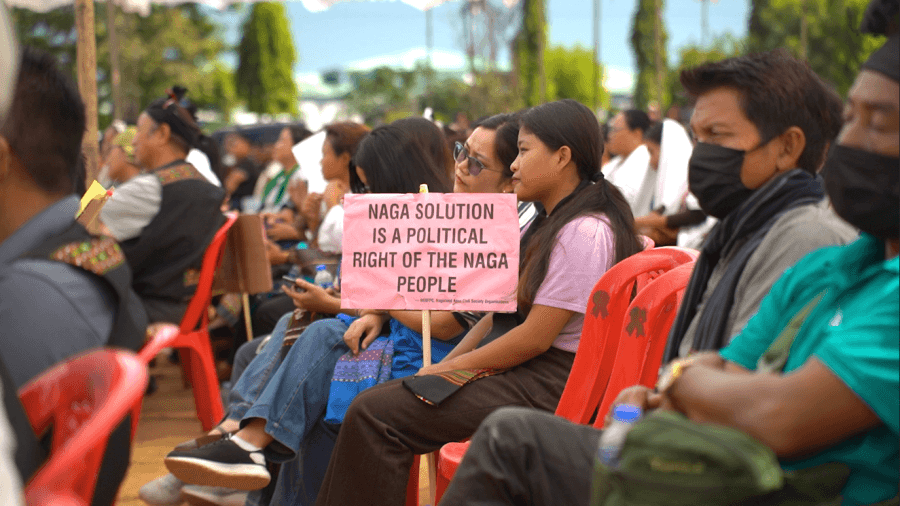TUESDAY, NOVEMBER 18, 2025
- Home
- Naga Common Platform rally urges early, honourable political solution
Naga Common Platform rally urges early, honourable political solution
The Naga Common Platform rally in Chümoukedima urged the government of India for an early, honourable, and inclusive settlement to the Indo-Naga Political Issue.
Share

DIMAPUR — Hundreds gathered at Agri Expo, Chümoukedima on Tuesday for the Naga Common Platform (NCP) rally, reaffirming their demand for an early, honourable and inclusive settlement to the long-pending Indo-Naga political issue.
The programme drew participants from different parts of the state amid rising frustration over the stalemate in negotiations.
Addressing the gathering, organising committee member KK Sema said the public continued to bear what he described as a relentless financial burden due to multiple “national taxes” imposed by various armed groups. He questioned the legitimacy of such practices, adding that new factions kept emerging while citizens complied out of fear and intimidation. He warned that the public patience may eventually reach a breaking point.
Sema said the common platform was not intended to function as a parallel movement, but to serve as an open forum for all sections of people. He stressed that the initiative sought only to push for an early resolution and did not challenge any group.

He criticised apex tribal bodies, who he said, “had no authority to impose personal views that undermine the aspirations of the people.” He further alleged that some hohos were operating under the influence of elected legislators and some had issued recent directives at the behest of the chief minister. According to him, the gathering aimed to reflect the concerns of the public directly to the state government.
Sema said the government of India had already ruled out the demands for sovereignty and integration. He also spoke of the long-standing role of Gaon Buras, saying they had historically been treated as “punching bags” during the early years of the Naga national movement.
He said the proliferation of 20–30 factions raised questions about the political objectives each group claimed to pursue, adding that the fragmentation had contributed to rampant taxation in the name of the national cause. He asserted that while citizens pay out of fear, leaders live in comfort, and warned that the public would eventually seek accountability for such “extravagant” lifestyles.

Referring to NSCN (IM), Sema said the group’s stated position of not accepting any settlement without a separate flag and constitution required transparency. He asked why details of their negotiations with the government of India were not shared with the people, whom he called the “true stakeholders”. Sema described the group’s claim of being sovereign while seeking a flag and constitution from the Centre as contradictory, while adding that the NSCN (IM) “cannot decide the Naga future in secrecy.”
He reiterated that the public wanted peace, development and a clear political settlement for future generations. He criticised both the state government and tribal bodies for failing to take decisive positions, adding that many hohos lacked authority and had prevented public participation in important discussions.
Also read: Naga Common Platform organisers clarify; reaffirm support for FNR
Sema also said the stalemate between NSCN (IM) and the Centre over the symbolic demands had compressed the future of the Nagas. He urged the group to be honest with the public and to consult them openly. He reaffirmed that sovereignty and integration were not on the table and said the Centre had indicated only “democratic integration” and autonomous arrangements for Nagas living in Assam, Manipur and Arunachal Pradesh.
Nagaland Gaonburas Federation advisor Vikuto Zhimomi said those present had gathered out of concern for the future. He asked who would take responsibility if the political talks fail and said any attempt to push the process forward often faced sabotage.
WATCH MORE:
He maintained that the gathering was not intended to criticise any particular group, and recalled that if an earlier peace process under a former government had been brought to completion, the present situation might have been avoided. He said this was the second major people-led effort to push the Centre and state government towards a settlement.
Former Ex-Parliamentarian Forum vice president and NGBF advisor C John said internal divisions had weakened what he termed the world’s longest freedom movement. He said factionalism had grown because of a struggle for leadership.
Read more: NGBF says November 18 rally aims to provide common platform for Naga political solution
Former ENPO vice president Yonglong Konyak, representing the Konyak community, said the Framework Agreement was already in place and that the Centre had asked Naga groups to unite. He said it was time to identify the real obstacles rather than shift blame.
Eastern GB Association president Chuba Konyak reiterated their long-held principle of “unity first and solution second”. He called for coordination between Naga organisations to clearly understand where the process is faltering and added that “lofty statements would not bring the solution.”

Stating that the ENPO’s absence should not be misunderstood, he clarified that the Naga political solution and the ENPO’s demand for a Frontier Nagaland Territory (FNT) are distinct issues, and the latter should not be viewed as an obstacle to the broader political discourse.
Former legislator, Z Lohe said many who attended the rally had done so at personal cost. He said attempts were made to prevent the rally, but the gathering was held nonetheless. Lohe said disunity, distrust and prolonged negotiations under successive ceasefires had affected the public, and that only an early solution could address these concerns.
He compared the situation to students studying for an examination but never appearing for it, questioning how results could be expected without action. Although factional killings had stopped, he said true peace remained elusive due to widespread taxation, and noted that some individuals opposed a settlement because they feared losing financial benefits and influence.
Lohe said the gathering sent a message to both the government of India and Naga negotiators that a solution was overdue, adding that agreements already signed were “growing old”. Citing the Centre’s success in curbing the Naxalite–Maoist movement, he warned that if Nagas failed to secure a settlement, the government might adopt a different approach. He recalled the earlier “surrender or die” slogan used in that context and asked whether Nagas were prepared for such a situation. He cautioned that without a settlement, political status and agreements under the “Agreed Position” could be lost.
Read more: NTHCC declines November 18 platform, warns against ‘parallel efforts’ in Naga reconciliation process
He asked Naga national leaders to reflect on public sentiment, saying the cadres had become stubborn and egoistic, while ordinary citizens continued to bear the consequences.
Short addresses were delivered by Sulanthung Lotha, president of Naga Hoho; Thepfulhouvi Solo, former NTC president; and social and political activist Chubatangit Jamir, while the welcome address was delivered by Shikuto Zhalipu, chairman of the NCP organising committee.
Theja Therieh of the Mediation Committee read out the three-point resolution adopted at the rally, which reaffirmed support for agreements signed between the Government of India, NSCN (IM) and the Working Committee of NNPGs; urged the Centre to deliver a settlement based on the Framework Agreement and Agreed Position; and called for the political talks to be brought to their logical conclusion after decades of struggle and 28 years of negotiation.

